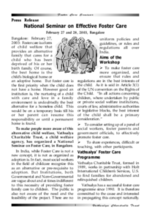This is a report from a two-day seminar on family foster care in India. Experts from various fields including NGOs, medical, legal, and government organizations, as well as participants from a number of Indian States shared their valuable experiences on how to provide effective family foster care programs for children.
Although temporary foster care and pre-adoptive foster care were familiar with a majority of program participants, many did not understand or appreciate the importance of long-term foster care. The participants felt that there was an urgent need to utilize the media to create awareness of this concept on a national level, particularly as an alternative to institutional care. Furthermore, participants sought to delineate the differences between temporary, pre-adoptive, and long-term foster care and address the specific issues pertaining to each.
To most effectively endorse foster care as an alternative to institutional care, there must be clarity and consensus with reference to recruitment, training and preparation of both families and children. There should be definite roles and responsibilities spelt out for adoptive families, agencies, birth families and the government. This document outlines guidelines for foster care using examples of current foster care programs in India. It also addresses key issues regarding foster care and the law. In conclusion, it advocates the formation of a national committee responsible for continuing to analyze, clarify, distribute, and monitor the guidelines for foster care in India.
©Vathsalya Charitable Trust

